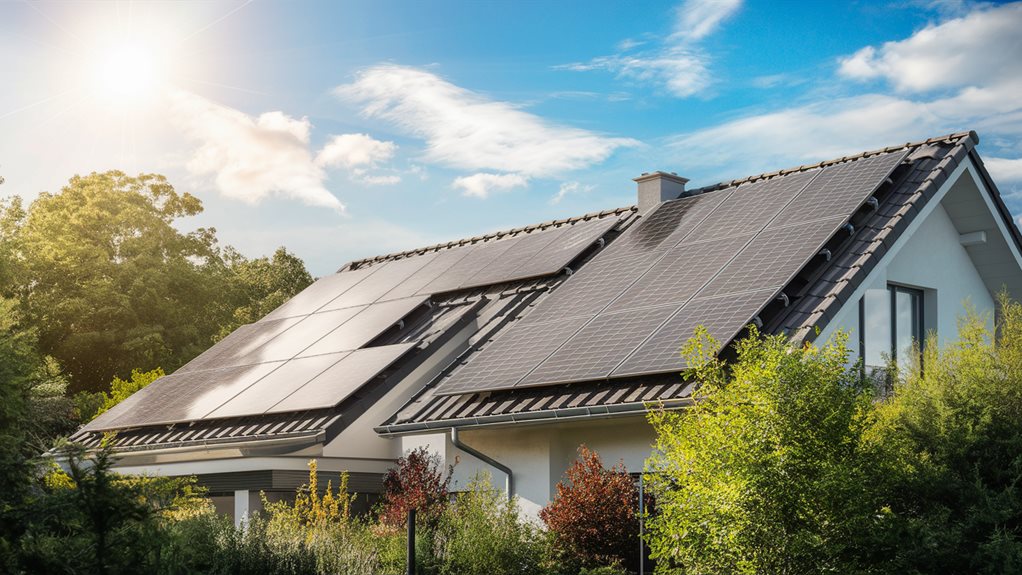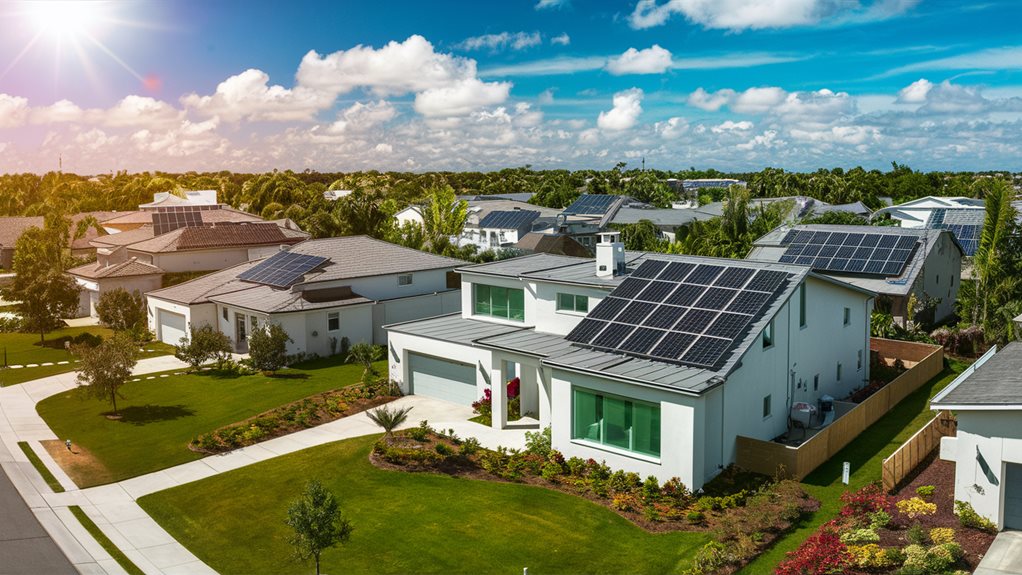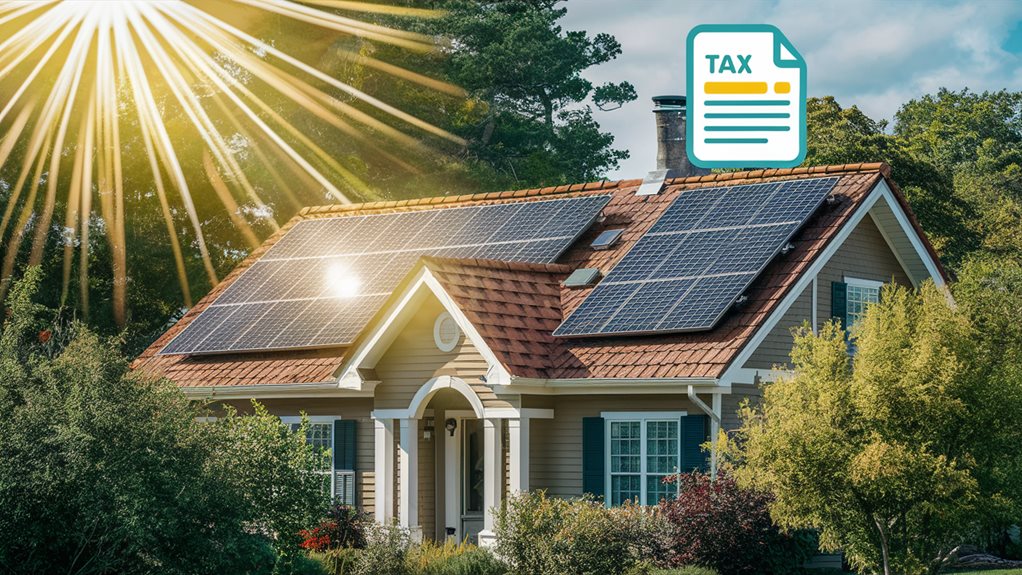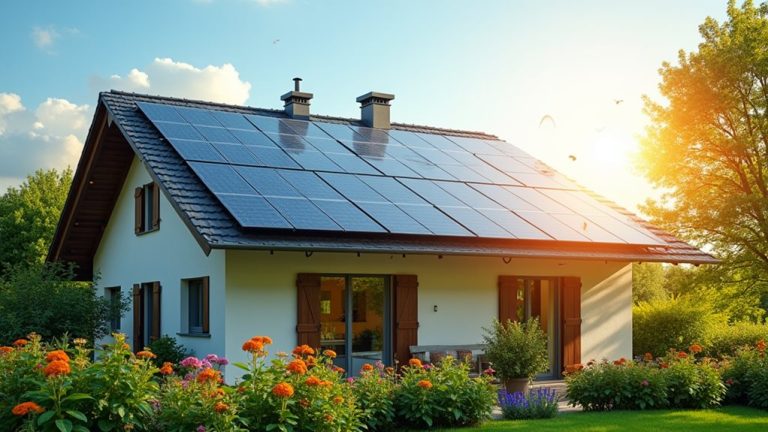The integration of solar energy systems in residential properties has emerged as a strategic approach to not only reduce energy consumption costs but also markedly enhance property value. With a surge in federal tax credits and state-level incentives designed to offset the initial installation expenses, homeowners are now more inclined to adopt these renewable energy solutions. This trend is compelling buyers to ponder solar-equipped homes, which typically command higher resale prices and demonstrate quicker market turnaround times. Yet, the true depth of financial benefits and the factors influencing solar energy's impact on property valuation remain intriguing areas for further exploration.
Expert Highlights
- Installing solar panels increases property values due to reduced energy bills and enhanced sustainability.
- Homes with solar systems often sell faster and for higher prices in competitive markets.
- Solar installations make properties more attractive to eco-conscious buyers with energy efficiency priorities.
- State and federal incentives contribute to increased property values by offsetting initial installation costs.
- A well-designed solar system enhances long-term financial stability, making the property more appealing.
Definition of Solar Energy
Solar energy encompasses the conversion of sunlight into usable forms of power, particularly through photovoltaic and thermal technologies. As a renewable resource, it offers significant environmental benefits, such as reducing reliance on fossil fuels and decreasing greenhouse gas emissions. Solar energy can be categorized into passive solar energy and active solar energy, based on the mode of conversion. Advancements in solar technology have not only improved efficiency and accessibility but also contributed to increasing property values by providing sustainable energy solutions.
Harnessing Sunlight for Power
In understanding the essence of harnessing sunlight for power, it is crucial to begin with a clear definition of solar energy: the light and heat emanating from the sun that can be tapped into for practical applications.
Solar energy, derived from the Latin "sol," involves capturing energy via photovoltaic panels. These panels convert sunlight into electricity through the photovoltaic effect, though efficiency improvements and storage innovations are continuously advancing. One such innovation in the field is the development of a dye-sensitized photoelectrosynthesis cell (DSPEC), which allows for the splitting of water into hydrogen and oxygen, storing hydrogen as a fuel for later use when sunlight is unavailable.
Renewable Energy Source Benefits
Understanding the benefits of renewable energy sources, particularly solar energy, begins with recognizing the diversity and renewability of these resources. Solar energy, alongside wind power and hydroelectricity, is derived from natural processes replenished faster than consumed. This displaces conventional fuels, reducing harmful emissions and health risks. Renewable energy is more evenly distributed globally than fossil fuels, which contributes to energy security and sustainability. Additionally, it contributes to economic growth by creating jobs and decreasing dependence on foreign energy sources, leading to a cleaner environment.
Solar Technology Advancements
Innovations in solar technology have markedly enhanced the efficiency and applicability of solar energy applications. Major advancements include tandem and perovskite solar cells, which greatly/substantially/considerably boost efficiency and accessibility. By harnessing a wider range of sunlight, these solar cells enhance electricity production and decrease costs, leading the way in sustainable energy generation. Novel designs like bifacial and transparent solar panels expand energy capture opportunities. Smart systems, integrated with IoT and advanced energy storage, optimize solar power use, further solidifying solar energy as a pivotal component of sustainable development.
Benefits
When considering the benefits of solar energy for increasing property value, several key factors emerge. Homeowners can drastically lower their energy bills thanks to solar panel installations, while enjoying environmental advantages through reduced carbon emissions. In fact, a 2019 Zillow study found that homes with solar systems sold for 4.1% more, highlighting the financial advantage of such installations. Additionally, the presence of attractive tax incentives and enhanced marketability due to eco-friendly features and cost savings make homes with solar systems more appealing to potential buyers.
Lower Energy Bills
Harnessing solar energy considerably lowers household energy bills, offering homeowners an attractive financial benefit. Solar panels reduce reliance on grid electricity, providing substantial savings. In certain regions like California, homes with solar systems often sell quicker and for a premium, thanks to the added property value. Homeowners can experience quick returns on investment, often within 5-7 years. Additionally, fixed rates offer protection against fluctuating utility prices. Net metering programs further enhance savings, making solar installations a wise choice for long-term financial stability and lower utility costs.
Environmental Impact Reduction
While reduced energy bills present immediate financial advantages, the broader benefits of solar energy extend considerably into environmental impact reduction.
Solar energy drastically decreases greenhouse gas emissions and air pollution, unlike traditional fossil fuels. It conserves water by using substantially less than conventional electricity production. Additionally, solar energy aids climate change mitigation as a renewable resource, aligning with global reduction goals and enhancing ecological health. Moreover, solar power does not emit harmful gases or toxins, contributing to improved air and water quality in surrounding areas.
Tax Incentives Available
The array of tax incentives available for solar energy adoption in the United States provides significant financial benefits that enhance the appeal of shifting to renewable energy sources. Federal tax credits, offering up to 30% savings, encompass initial installation costs for eligible solar systems. With property tax exemptions available in 36 states, these measures help make solar installations more economically feasible. State and local incentives, such as property and sales tax exemptions, further reduce costs. These strategies collectively increase the economic feasibility of solar investments.
Improved Home Marketability
- Faster Sales: Homes with solar panels sell 20% faster and spend less time on the market.
- Enhanced Appeal: Solar panels attract buyers seeking sustainable living.
- Higher Value: Solar-equipped homes increase resale value considerably, appealing to environmentally conscious buyers. Additionally, increased home value due to solar panel installation has become a significant factor for homeowners considering solar energy investments.
Tax Incentives Boost Savings
The landscape of tax incentives for solar installations continues to bolster financial savings for property owners, with recent federal tax credit updates offering significant benefits. At the federal level, substantial credits are available for solar system installations, complemented by various state-level incentive programs that further reduce the financial burden of implementation. Installation cost reductions are integral to these incentives, ensuring more homeowners can afford to adopt solar energy solutions. The Solar Investment Tax Credit (ITC) is a critical driver for the adoption of solar energy across commercial enterprises, offering a substantial 26% tax credit that reduces both initial capital requirements and tax obligations for installations.
| Tax Incentive Component |
Details |
| Federal Tax Credit |
30% credit for systems installed before 2033 |
| Post-2032 Tax Credit |
Reduced to 26% for installations in 2033 |
| Eligible Systems |
Solar water heaters, photovoltaic systems |
| Certification Requirement |
Must be certified by the Solar Rating and Certification Corporation (SRCC) |
| Installation Costs Covered | Tax credit extends to cover installation expenses
Federal Tax Credit Update
Recent updates to federal tax incentives for solar energy investments can substantially enhance savings for property owners. Eligible equipment includes photovoltaic solar installations and more, with a 30% tax credit valid in 2024. The credit decreases over the next decade but presents significant benefits:
- Direct Tax Liability Reduction: Dollar-for-dollar tax deduction.
- Rollover Option: Excess credit into future tax years.
- Increased Property Value: Solar addition.
State-Level Incentive Programs
Often, state-level incentive programs greatly amplify financial benefits for property owners investing in solar energy solutions. States such as Arizona and Massachusetts offer significant tax credits, while others like Maryland provide rebates.
Additionally, states extend 100% sales and property tax exemptions for solar installations. Programs like New York's net metering further enhance cost savings, making solar investments financially appealing while increasing property value.
Installation Cost Reductions
State-level incentive programs markedly enhance the financial allure of solar energy investments by working hand-in-hand with federal tax incentives. These collaborations considerably reduce solar installation costs, thereby accelerating adoption rates.
Key components include:
- Federal Tax Credits: 30% credit reduction on installation expenses.
- Power Purchase Agreements (PPAs): Avoid upfront costs while paying less for electricity.
- Rebate Opportunities: State rebates lower installation costs when combined with federal benefits.
FAQ
How Does Solar Panel Installation Affect Home Insurance?
Solar panel installation affects home insurance by potentially increasing premiums due to higher replacement costs and home value. Coverage adjustments may be necessary, ensuring protection for potential damages while optimizing benefits. Review and compare policies for extensive coverage.
Are There Financing Options Available for Solar Energy Systems?
Yes, financing options for solar energy systems are available, including loans from banks and credit unions, government programs, home equity options, and contractor-provided financing. Each offers flexibility in terms, interest rates, and credit requirements.
What Maintenance Is Required for Solar Panels?
Solar panels require cleaning two to four times annually, depending on environmental factors, using soft brushes and non-abrasive cleaners. Frequent visual inspections are advised. Regular maintenance guarantees efficiency, longevity, and optimizes the financial benefits of the system.
How Long Does It Take to Recoup the Solar Panel Investment?
The solar panel investment is typically recouped within 6 to 12 years in the United States, depending on factors such as electricity rates, installation costs, solar incentives, panel efficiency, and annual energy savings.
What Impact Do Solar Panels Have on the Aesthetic of a Property?
Solar panels considerably enhance a property's aesthetic by integrating seamlessly with its architectural design and offering visually appealing solutions, such as solar roof tiles and transparent panels, that align with various styles and increase public acceptance and adoption.
Experts Final Thoughts
The integration of solar energy systems into residential properties enhances property value by offering long-term energy cost reductions and attracting environmentally conscious buyers. The financial appeal of solar installations is further bolstered by substantial federal tax credits and state-level incentives, making them a strategic investment. Recent advancements in solar technology and reductions in installation costs have accelerated adoption rates, resulting in properties with solar panels often selling at a premium. Overall, solar installations present significant economic and environmental benefits for homeowners.











